When it comes to deer hunting, selecting the right caliber is crucial.
While there are many calibers that are effective for taking down a deer, there are also some that are not up to the task.
In this article, we will explore some of the worst deer hunting calibers and why you should avoid them.
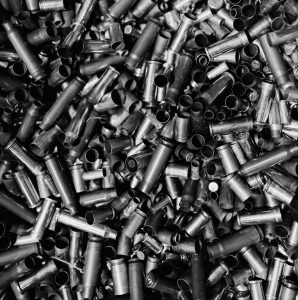
Hunters have their own preferences when it comes to calibers, but there are some that are universally considered to be poor choices for your hunting rifle.
These calibers may lack the necessary power and accuracy to take down a deer quickly and humanely.
It’s important to note that just because a caliber is not ideal for deer hunting, it doesn’t mean that it’s not suitable for other types of hunting or shooting sports.
In the following paragraphs, we will discuss some of the worst deer hunting calibers and what makes them unsuitable for the task.
We will also provide some tips for selecting the right caliber for your next deer hunting trip.
So, if you’re a hunter looking to improve your chances of success in the field, read on to learn more.
Understanding Deer Hunting Calibers
When it comes to deer hunting, choosing the right caliber is crucial. The wrong caliber can lead to missed shots, wounded animals, and a frustrating hunting experience.
In this section, we’ll discuss the factors you should consider when choosing a deer hunting caliber.
Bullet Velocity
Bullet velocity is an important factor to consider when choosing a deer hunting caliber.
A faster bullet will have more kinetic energy and will be able to penetrate deeper into the animal, causing more damage.
However, a bullet that is too fast can cause excessive meat damage and may not be legal in certain states.
Weight and Size
The weight and size of the bullet are also important factors to consider. A heavier bullet will have more momentum and will be able to penetrate deeper into the animal.
However, a heavier bullet may also cause excessive meat damage and may not be legal in certain states.
The size of the bullet is also important.
A larger bullet will cause more damage to the animal, but may not be as accurate as a smaller bullet. Additionally, a larger bullet may not be legal in certain states.
When choosing a deer hunting caliber, it’s important to consider all of these factors.
There are many great choices for low recoil hunting calibers.
Commonly Misused Calibers for Deer Hunting
.22 Long Rifle
The .22 Long Rifle is a popular caliber for small game hunting and plinking, but the .22LR is a terrible choice for deer hunting.
The bullet is too small and lacks the necessary energy to take down a deer quickly and humanely.
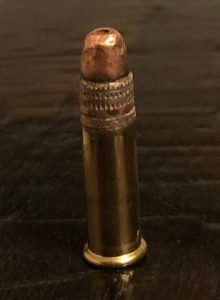
While it is possible to kill a deer with a .22 Long Rifle, it is not recommended for big game hunting and is illegal in many states.
.223 Remington
The .223 caliber is another inadequate choice for deer hunting due to its limited stopping power and penetration capabilities.
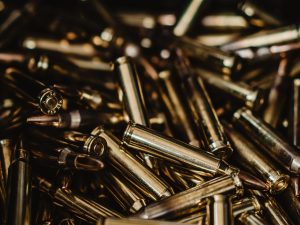
With lightweight bullets designed for varmint hunting, the .223 often fails to deliver swift, humane kills on deer-sized game.
This has the potential to wound the deer rather than cleanly taking it down.
Furthermore, its use for deer hunting is illegal in most states for this reason.
.25-20 Winchester
The .25-20 Winchester was a popular caliber for deer hunting in the early 20th century, but it has since fallen out of favor.
The bullet is too small and lacks the necessary energy to take down a deer quickly and humanely.
In addition, the .25-20 Winchester is difficult to find and expensive when compared to other, more suitable calibers.
.32-20 Winchester
The .32-20 Winchester is another caliber that was popular for deer hunting in the early 20th century but has since fallen out of favor. The bullet is too small and lacks the necessary energy to take down a deer quickly and humanely. In addition, the .32-20 Winchester is difficult to find and expensive when compared to other, more suitable calibers.
It is important to choose a caliber that is appropriate for the game you are hunting. Using a caliber that is too small can result in a wounded animal that suffers needlessly, while using a caliber that is too large can damage the meat and ruin the hunting experience. We recommend using a caliber that is specifically designed for deer hunting, such as the .243 Winchester, .270 Winchester, or .30-06 Springfield. These calibers have the necessary energy and bullet weight to take down a deer quickly and humanely.
Factors Making a Caliber Inefficient
When it comes to deer hunting, selecting the appropriate caliber is crucial. A poor choice of caliber can lead to a frustrating and unsuccessful hunting experience. Here are some factors that make a caliber inefficient:
Inadequate Energy
One of the most important factors to consider when selecting a caliber for deer hunting is energy.
A bullet needs to have enough kinetic energy to penetrate the deer’s skin, muscle, and bone to reach vital organs. If the bullet does not have enough energy, it might not be able to kill the deer humanely, resulting in a wounded deer.
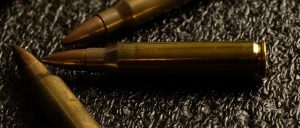
Poor Bullet Design
Bullet design is another crucial factor in selecting a caliber for deer hunting.
A poorly designed bullet can cause excessive tissue damage or fail to penetrate the deer’s skin and bone.
A bullet that expands too quickly can cause unnecessary damage to the meat, while a bullet that does not expand enough can fail to deliver a lethal blow.
Excessive Recoil
Recoil is the backward movement of your hunting rifle after it has been fired. Excessive recoil can lead to flinching, which can cause the shooter to miss the target or make a poor shot.
This is especially true for inexperienced hunters who are not used to the recoil of a particular caliber.
It is important to choose a caliber that the hunter can handle comfortably.
Selecting the right caliber for your deer rifle is crucial.
A poor choice of caliber can lead to a frustrating and unsuccessful hunting experience.
When selecting a caliber, it is important to consider factors such as energy, bullet design, and recoil. By taking these factors into account, hunters can choose a caliber that is efficient and effective for deer hunting.
Choosing the Right Caliber for Deer Hunting
Choosing the right caliber is critical for every deer hunter.
The right caliber will ensure a humane kill and make the hunting experience more enjoyable.
In this section, we will discuss two important factors to consider when choosing the right caliber for deer hunting: terrain considerations and deer size considerations.
Terrain Considerations
The terrain where you will be hunting is an important factor to consider when choosing a caliber.
If you will be hunting in thick brush or dense forests, a lighter caliber may be more appropriate. A lighter caliber will be easier to maneuver in tight spaces and will be less likely to cause damage to the surrounding vegetation.
On the other hand, if you will be hunting in open fields or areas with longer shooting ranges, a heavier caliber may be more appropriate. A heavier caliber will have better accuracy and stopping power at longer ranges.
Deer Size Considerations
Another important factor to consider when choosing a caliber is the size of the deer you will be hunting.
Smaller deer, such as whitetail deer, can be taken down with a variety of calibers.
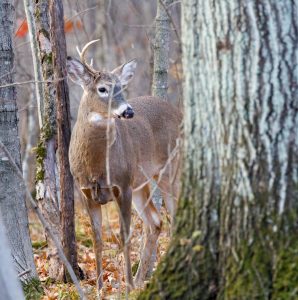
However, larger game, such as mule deer or elk, require a heavier caliber.
Using a caliber that is too light for the size of the deer can result in a wounded deer.
Choosing the right caliber for deer hunting is key. Consider the terrain and size of the deer when selecting a caliber.
With the right caliber, you can ensure a humane kill and a successful hunting experience.
Wrapping Up
After researching and analyzing various sources, we have come to the conclusion that there are certain calibers that are not ideal for deer hunting.
While personal preference and shooting ability play a role in selecting the right caliber, there are some calibers that are universally considered less effective for deer hunting.
Some of the worst calibers for deer are the .22LR, .22 Magnum, .223, and .22-250. These calibers lack the necessary power and energy to effectively take down a deer.
Additionally, the cartridges with low sectional density and muzzle velocity, such as the .30 Carbine and .35 Remington, are also not recommended for deer hunting.
On the other hand, there are calibers that are highly recommended for deer hunting, such as the .270 Winchester, .308 Winchester, and .30-06 Springfield. These cartridges have high sectional density and muzzle velocity, providing the necessary energy and penetration for an ethical kill.
It is important to note that selecting the right caliber for deer hunting is just one aspect of the overall hunting experience.
Proper shot placement, hunting ethics, and knowledge of the animal’s behavior and habitat are equally important factors to consider.
Choosing the right caliber for deer hunting is crucial for a successful and ethical hunt. By avoiding the worst deer hunting calibers and selecting a recommended caliber, hunters can increase their chances of a clean and humane kill.
Frequently Asked Questions
What is the most effective deer hunting caliber?
The most effective deer hunting caliber is subjective and can vary based on personal preference, hunting style, and the terrain you are hunting in.
However, some of the most commonly used calibers for deer hunting include .270 Winchester, .30-06 Springfield, and .308 Winchester. These calibers are popular because they offer a good balance of accuracy, power, and recoil.
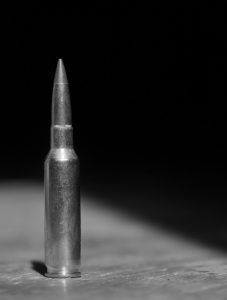
We have an entire article on our favorite deer hunting rifles.
Which rifle calibers should be avoided for deer hunting?
While there are many calibers that are suitable for deer hunting, there are also some that should be avoided.
Some of the calibers that are not recommended for deer hunting include .17 HMR, .22LR, .223 Remington, .22-250, and .25-35 Winchester.
These calibers are either too small or too fast, which can result in wounding rather than a clean kill.
What are some forgotten calibers for deer hunting?
There are several forgotten calibers for deer hunting that are worth considering.
These calibers include .35 Remington, .300 Savage, and .32 Winchester Special.
While these calibers may not be as popular as some of the more common calibers, they can still be effective for deer hunting when used properly.
What are some common mistakes made by beginner deer hunters when choosing a caliber?
One common mistake made by beginner deer hunters when choosing a caliber is selecting a caliber that is too small or too fast. This can result in wounding rather than a clean kill.
Another mistake is choosing a caliber that has too much recoil, which can make it difficult to shoot accurately. It’s important to choose a caliber that you are comfortable shooting and that is appropriate for the size of the deer you are hunting.